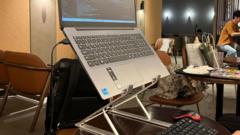"In response to the overwhelming presence of long-staying students in cafes, particularly those designated for studying, South Korean coffee chains like Starbucks are implementing policies to maintain a balance between study spaces and customer turnover, reflecting a cultural trend that has emerged over the last decade."
"Cafes in South Korea Grapple with Long-Staying Study Enthusiasts"

"Cafes in South Korea Grapple with Long-Staying Study Enthusiasts"
"As cafes become popular study hubs, South Korean establishments face challenges with customers overstaying, prompting new guidelines and policies."
In affluent Seoul, the rise of the Cagongjok phenomenon—young South Koreans gravitating towards cafes for studying or working—is sparking significant challenges for coffee shop owners. This trend, particularly prevalent in areas populated with students and professionals, is forcing businesses to put in place new regulations. Hyun Sung-joo, a coffee shop owner in Daechi, illustrates the dilemma as he recounts a recent experience where a customer commandeered a table with two laptops and a six-port power strip, staying for an entire day. “With Daechi's high rents, it's difficult to run a cafe if someone occupies a seat all day,” he reveals.
Inspired by these challenges, Starbucks Korea has issued nationwide guidelines to address what has been termed as “extreme cases.” While Starbucks staff will offer guidance rather than evict customers, these measures aim to foster a more welcoming environment amid concerns such as theft from unattended belongings. Students seeking refuge in cafes for study continue to dominate the scene, with a remarkable number reporting that their time spent working in cafes stretches from morning into late evening.
This recent shift has ignited mixed reactions from patrons. Many welcome the new restrictions as necessary adjustments to restore the traditional use of cafes, especially those who favor socialization over study. However, some see the guidelines as overly restrictive and akin to abandoning the informal culture that cafes once promoted. These debates are part of an ongoing discussion that highlights the success of coffee chains in South Korea, where there has been a near doubling in the number of coffee shops over the past five years.
Striking a balance between accommodating study enthusiasts and maintaining a comfortable environment has proven challenging for independent cafes as well. While some independent operators are flexible with customers who respect shared spaces, others have introduced stringent policies. An anonymous cafe owner in Jeonju describes implementing a "No Study Zone," noting that two customers could monopolize space meant for many.
Amidst these tensions lie deeper societal issues, as many in South Korea prefer cafes for studying rather than traditional libraries or home environments. For individuals like Yu-jin Mo, a 29-year-old who finds solace in cafes due to a turbulent childhood, the appeal of these spaces transcends mere productivity. Additionally, Professor Choi Ra-young from Ansan University argues that the Cagongjok phenomenon is a response to the intense pressures of South Korea’s competitive society, creating a need for more inclusive public spaces.
As the cultural landscape evolves, both cafe owners and educators express a desire for better solutions that honor the dual nature of cafes—as places for study while accommodating those looking for a cozy environment to socialize. In a society marked by academic and professional stresses, the future of cafes serving as community hubs hinges on finding that delicate balance.


















